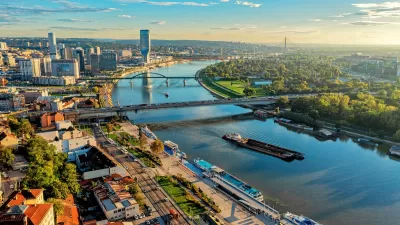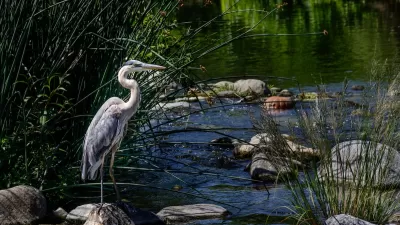This article from National Geographic examines the rapidly depleted Jordan River and how saving it could bring Israel and its quarreling neighbors together.
A six-year drought, pollution and overuse have heightened tensions between Israelis, Palestinians and Jordanians who depend on water from the Jordan River.
"The fight over the Jordan illustrates the potential for conflict over water that exists throughout the world. We live on a planet where neighbors have been clubbing each other over rivers for thousands of years. (The word "rival," from the Latin rivalis, originally described competitors for a river or stream.) Worldwide, a long list of watersheds brims with potential clashes: between India and Pakistan over the Indus; Ethiopia and Egypt over the Nile; Turkey and Syria over the Euphrates; Botswana and Namibia over the Okavango. Yet according to researchers at Oregon State University, of the 37 actual military conflicts over water since 1950, 32 took place in the Middle East; 30 of them involved Israel and its Arab neighbors. Of those, practically all were over the Jordan River and its tributaries, which supply millions of people with water for drinking, bathing, and farming."
FULL STORY: Parting the Waters

Manufactured Crisis: Losing the Nation’s Largest Source of Unsubsidized Affordable Housing
Manufactured housing communities have long been an affordable housing option for millions of people living in the U.S., but that affordability is disappearing rapidly. How did we get here?

Americans May Be Stuck — But Why?
Americans are moving a lot less than they once did, and that is a problem. While Yoni Applebaum, in his highly-publicized article Stuck, gets the reasons badly wrong, it's still important to ask: why are we moving so much less than before?

Using Old Oil and Gas Wells for Green Energy Storage
Penn State researchers have found that repurposing abandoned oil and gas wells for geothermal-assisted compressed-air energy storage can boost efficiency, reduce environmental risks, and support clean energy and job transitions.

Updating LA’s Tree Rules Could Bring More Shade to Underserved Neighborhoods
A new USC study finds that relaxing Los Angeles’ outdated tree planting guidelines could significantly expand urban tree canopy and reduce shade disparities in lower-income neighborhoods, though infrastructure investments are also needed.

California's Canal Solar Projects Aim to Conserve Resources and Expand Clean Energy
California’s Project Nexus has begun generating electricity from solar panels installed over irrigation canals, with researchers and state agencies exploring statewide expansion to conserve water and boost clean energy production.

HHS Staff Cuts Gut Energy Assistance Program
The full staff of a federal program that distributes heating and cooling assistance for low-income families was laid off, jeopardizing the program’s operations.
Urban Design for Planners 1: Software Tools
This six-course series explores essential urban design concepts using open source software and equips planners with the tools they need to participate fully in the urban design process.
Planning for Universal Design
Learn the tools for implementing Universal Design in planning regulations.
Heyer Gruel & Associates PA
City of Moreno Valley
Institute for Housing and Urban Development Studies (IHS)
City of Grandview
Harvard GSD Executive Education
Salt Lake City
NYU Wagner Graduate School of Public Service
City of Cambridge, Maryland





























